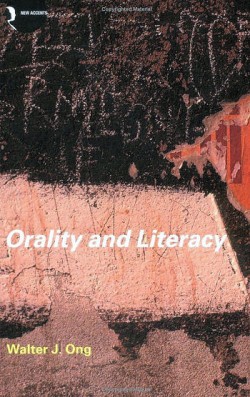 In Walter Ong’s classic book Orality and Literacy, he shares a fascinating theory about why our modern Western culture thinks so differently than the way the Bible does.
In Walter Ong’s classic book Orality and Literacy, he shares a fascinating theory about why our modern Western culture thinks so differently than the way the Bible does.
Eastern thinking, like what you find in the Old Testament, is very concrete and image-oriented, and it uses stories and parables to explain rather than abstract logic. It is relational and group-oriented rather than individualistic, and it focuses on action rather than internalized belief. If you read the articles at engediresourcecenter.com, you know that you miss a lot of the most important truths of the Bible if you don’t understand the way it thinks.
Ong describes studies done in cultures which have never had a written language, and he finds that they tend to be of the mindset that we call “Eastern.” Learning is always by direct experience, or by relationship, or by stories told within the family. One learns cooking or hunting by being with another who knows the skill, never from a book. Knowledge is never a disembodied group of facts – it always is concrete and comes from ones senses, and other people.
 When a culture becomes deeply literate and relies almost completely on reading as the medium for passing on knowledge, people’s patterns of thought change. Think about what happens in the process of reading: You interact with a set of abstract characters and mentally reconstruct what the text means. You forget about the person who wrote the text and focus only on the concepts in your mind. You also don’t interact with anyone else, and in fact you really can’t while reading. Through this process you are acquiring the mental habits of individualism, abstract thinking and internalization – all characteristics of the Western mind.
When a culture becomes deeply literate and relies almost completely on reading as the medium for passing on knowledge, people’s patterns of thought change. Think about what happens in the process of reading: You interact with a set of abstract characters and mentally reconstruct what the text means. You forget about the person who wrote the text and focus only on the concepts in your mind. You also don’t interact with anyone else, and in fact you really can’t while reading. Through this process you are acquiring the mental habits of individualism, abstract thinking and internalization – all characteristics of the Western mind.
Ong theorizes that the origin of the difference in Western thinking comes from the rise of literacy in Greece in ancient times. He points out that oral communication is universal among humans, but writing is a fairly recent invention. And he says that the invention of a completely abstract, phonetic alphabet only happened once in human history, in ancient Greece. Other languages had an alphabet, but oral information was still necessary. For instance, ancient Hebrew has no vowels, so readers needed to hear a text orally from someone who knew it.
Cultures outside the West adopted the Greek alphabet-based writing system, but many retained much more of their oral transmission style. This means that the biblical, Hebraic pattern of thought is actually the more universal pattern – it is us that have changed and moved away from it! Africans, Asians and Native Americans all say that the Eastern way of thinking is much closer to the way that they think. Of course they are literate cultures, but they have internalized its patterns of thought less than ours has.
We have a hard time imagining that an oral culture isn’t hopelessly backward. To us the word “illiterate” is synonymous with total ignorance, and we teach our children to read as soon as we can. But when literacy was first becoming common in ancient Greece, philosophers like Plato considered it a crutch for the weak-minded that would lead to people’s widespread ignorance and loss of memory. (Remember how when calculators came out, we saw them as a crutch that would rob people of the ability to do math?)
 In fact, many oral cultures the emphasis is on learning by memory, and they were quite skilled at this. In Jesus’ time, it is likely that boys memorized the Torah and much of the Scriptures by heart. Still today there is a strong emphasis on memorization among Orthodox Jews. This is why Jesus’ teaching was peppered with brief allusions to the Scriptures—he assumed his audience knew it all by heart, so the smallest of reference was all he needed. Rabbis still do this today.
In fact, many oral cultures the emphasis is on learning by memory, and they were quite skilled at this. In Jesus’ time, it is likely that boys memorized the Torah and much of the Scriptures by heart. Still today there is a strong emphasis on memorization among Orthodox Jews. This is why Jesus’ teaching was peppered with brief allusions to the Scriptures—he assumed his audience knew it all by heart, so the smallest of reference was all he needed. Rabbis still do this today.
Also, much of rabbinic commentary is done by linking together passages, noticing that one rare word is found in two important places. For instance, ve’ahavta (and you shall love) is found in Deuteronomy 6:5 – “And you shall love the Lord your God” and also in Leviticus 19:18 – “You shall love your neighbor as yourself.” Jewish thinkers before Jesus had connected the two passages because one passage reminded them of the other as they recited the words. When you have it all memorized, this is easy and obvious, but if you don’t, it’s not something you’d ever guess.
Of course there are enormous advantages in literacy – you can communicate at a distance and learn from others than those directly around you. You can construct lengthy, complex chains of reasoning that you couldn’t without something to write it down as you go. Despite the advantages of literacy, I wonder if our loss of memory has disconnected us with Jesus too.
Photos by Moriza and Amrufm, Flickr.com
Bill Carter says
Dear Ms. Tverberg,
I very much appreciate your work and the EnGedi website. I really do like this beautiful website as well, and I look forward to reading your new book on Rabbi Jesus. I discovered the EnGedi website while teaching a class using one of Ray Vander Laan’s video series. I then purchased “Listening to the Language of the Bible” and liked it so much that I am presently teaching a class at my church that is based on the devotionals in your book. (I stole your title as well.) I am a former graduate student in English, so I have some language background, and I serve as the Adult Education ministry leader at my church, Campus View church of Christ in Athens, GA, home of the University of Georgia. I must ask if you are familiar with the great work of Joseph Shulam in Jerusalem. His ministry is called Netivyah, and our church has helped to support him and Neivyah for many years. The story of his conversion and life is one of the most amazing tales of God working in a person’s life that I have ever heard, and to listen to this man teach is powerful indeed. May God bless your efforts, please keep it up.
Regards,
Bill Carter
Ted M. Gossard says
I have to say I like both. We can benefit from both. Through what they didn’t have we have easy access to many helpful books, and it appears that Paul was a devoted reader himself (2 Timothy, I recall, and just considering his life).
But that we would profit immensely from Hebraic practices such as speaking and hearing God’s word, and seeing it together, does stand to reason as well, and is surely a part of the entire Bible, though we haven’t seen that well.
Good thoughts here, Lois.
brandon eckardt says
Hebrew people were imagery people who thought function instead of form as Greeks & western people e.g God covered Moses with His hand, Now does God have a hand? No, God’s a Spirit. So what does a hand do then? It shelters or protects etc. So God protected Moses.
brandon eckardt says
Hi Ms Tverberg,
I’ve come to realise that the more I’m learning about the hebraic customs, the easier it is to understand the Bible. I believe it’s simply because the Bible was written by hebrew men inspired by a hebrew God, living in a hebrew culture so it would stand to reason why then understanding hebraic culture just makes God’s word so much easier to understand.
Thanx again for this site & all that’s available here.
Alex Renko says
I’m very grateful for your work and contibution to the foundational component of the Christian faith.
I was raised in the Jewish faith and became a follower of Yeshua at the age of 37 (5 years ago).
I have been quite shocked by the lack of historical, cultural and philosophical perspective of the hebraic world view I have encountered.
I’ve been leading a small group study of Ray Vander Laan’s Faith Lessons series. The interest level at our church has gotten high and I plan on introducing your new book to the discussion later this Fall.
Again, thank you and please continue to teach and enlighten us.
Pastor Garry Oliver says
Dear Lois,
Thank you so, so much for your book that you sent to my old church a few months ago…Grace Baptist Church in Spokane. I am now at Lincoln Heights Community Church in Spokane. I began reading that wonderful little volume about two months ago and just read two or three pages a day…so that I can soak it up in small pieces. It is so beautifully written and has so much of the content I have read over the years from many sources. Thank you so much for sending me a copy.
In Christ Jesus our Messiah,
Ollie
Nancy Petrey says
Wow! The first class of “Sitting at the Feet of Rabbi Jesus” last night was just great! An answer to prayer! The Lord helped me cover the first two chapters, and the 17 students loved it! This article, “Hebraic Thinking is That of an Oral Culture,” is so thought-provoking. I hope I can develop the “Eastern mind” and have more interaction with the Lord and others. How appealing! Thanks for pointing these things out to us. I appreciate all your work.
Sincerely,
Nancy Petrey
Daniel says
I wonder though, you say reading in the West began to individuate the self from the community, but until the Middle Ages when people read they usually read aloud, right? It was still a communal or quasi-communal practice, I think.